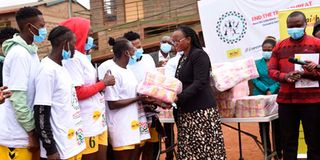Campaign targets three threats facing Kenyan teenagers

Health Principal Secretary Susan Mochache distributing sanitary pads to girls at Mathare Youth Sports Association Grounds in Nairobi on July 5,2022 during the sensitisation of community on teenage pregnancies,Gender Based Violence and new HIV Infections among adolescents.
Teenage pregnancies remain a threat to the war against HIV, with infections remaining high among adolescents and the youth.
According to the Ministry of Health, while Aids-related deaths have declined in the last 20 years, at least 98 new HIV infections were recorded every week among adolescents aged 10 to 19.
Kenya has the third highest teenage pregnancy rate in the world, with one in every five women aged 15 to 19 being mothers or pregnant with their first child.
Speaking during a sensitisation meeting for community gatekeepers in Nairobi on Tuesday to “end the triple threat in adolescents", Health Principal Secretary Susan Mochache said teenage pregnancies point to rampant unprotected sex.
Ms Mochache said that about 21 percent – totalling 317,644 – of all pregnancies in 2021 were among adolescents aged 10-19.
“In Kenya, the painful truth is that one out of every three mothers attending an antenatal clinic is an adolescent girl aged 10-19,” she said.
“We also know that one in three of our adolescent and young girls under the age of 18 have ever experienced some form of violence including sexual and gender-based violence.”
She noted that 56 per cent of all teenage pregnancies in 2021, totalling 20,803, came from nine counties – Nairobi, Kajiado, Homa Bay, Meru, Kericho, Narok, Kisii, Mandera and Bomet.
The “end the triple threat in adolescents" campaign is aimed at creating “a movement of champions for the elimination of three major challenges facing our young people”.
Risk of HIV infection
“Dubbed the Triple Threat, the risk of HIV infection, adolescent pregnancies and sexual and gender-based violence have persistently undermined the health, education and economic empowerment of young girls,” PS Mochache said.
While Kenya has recorded fewer cases of sexual and gender-based violence among adolescents and women in the last five months compared with the same period last year, more efforts need to be put into ending the vices.
PS Mochache said the strategy includes having “a prevention lens that involves individuals, families and communities”.
“Our legal frameworks and policies are designed to protect the rights of all citizens including women and girls against all forms of violence,” she said.
“It is for this reason that the Ministry of Health acknowledges the need to forge a partnership between government and citizens as a pathfinder to collectively eliminate the triple challenge across the country.”
The PS expressed optimism, saying cases of sexual and gender violence and teenage pregnancies have declined in the last three years.





